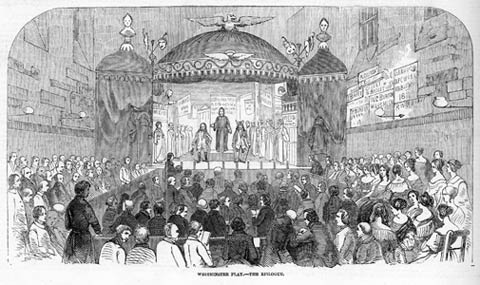|

NOTES ON ISSUE 7: HISTORICAL GLOSSARY
PART 1 OF 2
Printable View
The
bank had foreclosed a mortgage effected on the property thus
pleasantly situated by one of the Coketown magnates, who, in
his determination to make a shorter cut than usual to an enormous
fortune, overspeculated himself by about two hundred thousand
pounds. These accidents did sometimes happen in the best regulated
families of Coketown, but the bankrupts had no connection whatever
with the improvident classes.
In the nineteenth century, bankruptcy protection was afforded only to tradesmen. Others who failed financially were called “insolvent debtors” and could be imprisoned for their debts.
“the engravings of a man shaving
himself in a boot, on the blacking bottles that I was overjoyed
to use in cleaning boots with”
Pictures of a man shaving on bottles of boot-blacking were meant to indicate that the polish yielded a mirrorlike finish. The reference to these pictures from bottles of blacking alludes to Dickens's history of working as a child in pasting printed labels on bottles in Warren's blacking factory.
“Went to Westminster School as a
King's Scholar”
The Westminster School, established by Henry VIII in the sixteenth century, offered King's Scholars free tuition and board. The scholarships were awarded based on oral examinations. A few places were reserved for Westminster boys at Oxford and Cambridge, and boys from this prestigious school generally went on to success.
sleeping in market-baskets
Homeless children in Covent Garden market in London were seen to sleep in the market baskets; the scene is described by Dickens in The Uncommercial Traveler as well as in an earlier article in Household Words.
used to act in Latin, in the Westminster
School plays
Royalty and other dignitaries attended the Westminster School plays, performed in Latin. The plays were a centuries-old tradition that lasted into the twentieth century. The Illustrated London News often included coverage of the yearly play; this illustration is taken from the issue of January 1, 1848:

up a narrow dark back street in
Antwerp
Bankrupts and debtors from England often
moved to the Continent, where they could find cheap lodgings
and freedom from social censure.
|

